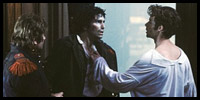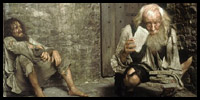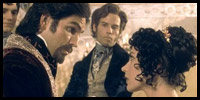
 |
The Count of Monte Cristo (2002) Directed by Kevin Reynolds Cast: James Caviezel, Guy Pearce, Dagmara Dominczyk, Henry Cavill, Richard Harris, JB Blanc, Luis Guzman, Michael Wincott, James Frain, Helen McCrory. 2002 – 132 minutes Rated: Reviewed by Dustin Putman, January 25, 2002.  Classic author Alexandre Dumas has not fared particularly well as of late with his myriad film adaptations. 1998 brought the laughable "The Man in the Iron Mask," and 2001 saw "The Musketeer" blunder onto movie screens to become one of the biggest misfires of the year. When compared to these embarrassments that likely have Dumas rolling over in his grave, "The Count of Monte Cristo" is a notable improvement but, on its own, is nothing more than forgettable Saturday matinee fare.
Classic author Alexandre Dumas has not fared particularly well as of late with his myriad film adaptations. 1998 brought the laughable "The Man in the Iron Mask," and 2001 saw "The Musketeer" blunder onto movie screens to become one of the biggest misfires of the year. When compared to these embarrassments that likely have Dumas rolling over in his grave, "The Count of Monte Cristo" is a notable improvement but, on its own, is nothing more than forgettable Saturday matinee fare.
As directed by Kevin Reynolds (1995's "Waterworld"), it is clear most of the time that the man behind the camera knows how to set up a story and amiably allow it to play out. Where "The Count of Monte Cristo" runs into trouble, then, is in its often tedious, episodic nature, and a third act that doesn't know when to quit. A further pitfall is that this particular story has been adapted over a dozen times in the past, making the picture an admittedly monotonous and passe experience.  Edmund Dantes (James Caviezel) and Fernand Mondego (Guy Pearce) are shipmates in early 19th century France who come upon the island of Elba, where Napoleon has been exiled, with their fatally wounded captain in tow. When Napoleon secretly gives Edmund a letter for him to deliver in Marseilles, he innocently accepts. Returning home, he is promptly promoted to the position of head captain and rekindles the flame with longtime love Mercedes (Dagmara Dominczyk). Just as things could not get any better for Edmund, he is arrested for attempting to deliver a treasonous letter to Napoleon's secret agents (the particulars of which he had no idea about) and, worse yet, discovers that it is Fernand who sold him out.
Edmund Dantes (James Caviezel) and Fernand Mondego (Guy Pearce) are shipmates in early 19th century France who come upon the island of Elba, where Napoleon has been exiled, with their fatally wounded captain in tow. When Napoleon secretly gives Edmund a letter for him to deliver in Marseilles, he innocently accepts. Returning home, he is promptly promoted to the position of head captain and rekindles the flame with longtime love Mercedes (Dagmara Dominczyk). Just as things could not get any better for Edmund, he is arrested for attempting to deliver a treasonous letter to Napoleon's secret agents (the particulars of which he had no idea about) and, worse yet, discovers that it is Fernand who sold him out.
Falsely thought to be executed, Mercedes marries Fernand, instead, and has a child, oblivious to her new husband's traitor ways. Meanwhile, Edmund has been taken to the barbarous prison, Chateau d'If, where he is left to spend the rest of his days. Fate comes to him from below the ground, literally, when fellow prisoner, the elderly priest Faria (Richard Harris), mistakenly breaks through into Edmund's cell while attempting to dig his way off the premises. After being well-educated, taught the finer points of sword fighting, and clued in to a hidden treasure capable of transforming him into an extremely wealthy man from the wise Faria, Edmund prepares his escape from imprisonment and his ultimate revenge upon those that wronged him.  Having never read Alexandre Dumas' novel of the same name, I cannot vouch for how faithful "The Count of Monte Cristo" is to the source material. The finished cinematic product, however, is an adventure-cum-revenge-fantasy that has a relatively simple premise nevertheless overstuffed to the point of combustion. The clearly defined three sections of the film (the setup, the prison, and the revenge plot) may keep one's attention by themselves but, as a whole, do not gel in any consistent or mellifluous manner. More importantly, the arduous plight of Edmund Dantes never grows involving enough for the viewer to care either way about how his life turns out. For a 133-minute motion picture, such disinterest is celluloid suicide.
Having never read Alexandre Dumas' novel of the same name, I cannot vouch for how faithful "The Count of Monte Cristo" is to the source material. The finished cinematic product, however, is an adventure-cum-revenge-fantasy that has a relatively simple premise nevertheless overstuffed to the point of combustion. The clearly defined three sections of the film (the setup, the prison, and the revenge plot) may keep one's attention by themselves but, as a whole, do not gel in any consistent or mellifluous manner. More importantly, the arduous plight of Edmund Dantes never grows involving enough for the viewer to care either way about how his life turns out. For a 133-minute motion picture, such disinterest is celluloid suicide.
 For a swashbuckling period piece, the actors acquit themselves well enough, but exhibit no positive traits we haven't seen them use to more successful effect in other movies. James Caviezel (2001's "Angel Eyes"), as Edmund Dantes, palpably exhibits the wounds of an innocent man betrayed, while Guy Pearce (1999's "Ravenous") relishes his spitefully villainous role of Fernand Mondego. As the fought-after Mercedes, Dagmara Dominczyk (2001's "Rock Star") gives a passionate, accurately felt performance, all the while trying to fight her lavish corsets for screen time.
For a swashbuckling period piece, the actors acquit themselves well enough, but exhibit no positive traits we haven't seen them use to more successful effect in other movies. James Caviezel (2001's "Angel Eyes"), as Edmund Dantes, palpably exhibits the wounds of an innocent man betrayed, while Guy Pearce (1999's "Ravenous") relishes his spitefully villainous role of Fernand Mondego. As the fought-after Mercedes, Dagmara Dominczyk (2001's "Rock Star") gives a passionate, accurately felt performance, all the while trying to fight her lavish corsets for screen time.
Amazingly, these three central characters age 16 years throughout the course of the story but do not physically appear to have aged a single day. Making things more ludicrous is that we are supposed to believe Edmund has changed so much that no one recognizes him when he returns, even though he looks exactly the same (save for a little more facial hair).  There are just enough sporadic unforeseen plot developments as "The Count of Monte Cristo" moves along, including the clever way Edmund escapes from confinement, that it narrowly dodges being a total chore to sit through. Also cause for at least a modicum of celebration is director Reynolds' and screenwriter Jay Wolpert's wise decision to not put a silly martial arts spin on the material (like "The Musketeer" did). Still, no matter how powerful Dumas' story might have been 50 years ago, it is now unextraordinary, at best. "The Count of Monte Cristo" is like the amateur entertainer who thinks his material works when, really, there is nothing remotely special about it.
There are just enough sporadic unforeseen plot developments as "The Count of Monte Cristo" moves along, including the clever way Edmund escapes from confinement, that it narrowly dodges being a total chore to sit through. Also cause for at least a modicum of celebration is director Reynolds' and screenwriter Jay Wolpert's wise decision to not put a silly martial arts spin on the material (like "The Musketeer" did). Still, no matter how powerful Dumas' story might have been 50 years ago, it is now unextraordinary, at best. "The Count of Monte Cristo" is like the amateur entertainer who thinks his material works when, really, there is nothing remotely special about it.
©2002 by Dustin Putman |
 |













